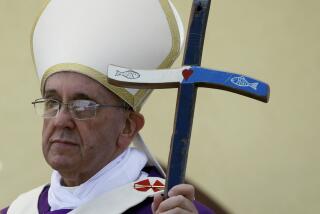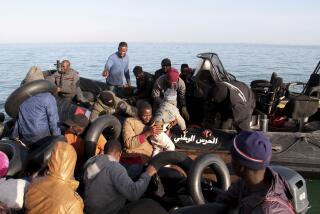Pope Seeks Tolerance in Visit to Tunisia
- Share via
VATICAN CITY — Frail but determined, Pope John Paul II ventures into Muslim North Africa on Sunday for a pep-rally visit to a fading Roman Catholic Church there and to deliver a call for religious tolerance that is meant to echo across the Middle East.
The one-day visit to Tunisia will also test the 75-year-old pope’s stamina after fresh alarm about his health and an exhausting week of Easter ceremonies at the Vatican.
At a Mass in Tunis and in meetings with political, cultural and religious leaders, John Paul is expected to hail strong Muslim-Christian cooperation in Tunisia as a model for the region.
The pope asked Muslim states to allow greater religious freedom in his annual “state of the world” address to diplomats from 161 countries at the Vatican earlier this year.
Christian communities survive today as tiny minorities in lands of North Africa that were major centers of the early Christian church.
Ancient Carthage, whose ruins drowse in the desert sun outside Tunis, was an important meeting place for early Christian leaders and home to St. Augustine.
Christianity receded with the growth of Islam, but Catholic communities are still active across North Africa, in ever-smaller numbers.
There were 265,000 Catholics in Tunisia when it became independent in 1956. By 1975, the number had fallen to 20,000. Today, there are an estimated 18,000 Catholics, most of them foreigners, living in 14 parishes in a nation of 8.5 million.
Vatican insiders said the pope’s visit carries no overtones for new evangelization. Rather, they say, he is anxious that the church maintain its small missionary presence in North Africa, both as a reminder of the past and as a harbinger of successful regional dialogue with majority Muslims.
In meeting Tunisian leaders, John Paul will stress the social role of the church in an authoritarian but religiously tolerant developing country. With 45 priests and 168 nuns in Tunisia, the church runs 20 schools, a hospital and clinics for the disabled. Elsewhere in the Maghreb, the church believes that it is under fierce pressure.
In Algeria, it is trapped between an embattled government and militants fighting to create a fundamentalist Islamic state. At least a dozen missionaries have died in the cross-fire so far, and the pope has appealed publicly to Algerian kidnappers to release seven Trappist monks taken from their mountain monastery last month.
Reflecting John Paul’s advancing age and his bad right leg, the Tunisia schedule, though long, is designed to husband papal strength with a limited number of appearances that do not require great mobility.
Twice in recent months the Vatican has been alarmed over the health of the aging Polish pope, who came to St. Peter’s as a robust outdoorsman in 1978.
These days, John Paul is dogged by a marked stoop, a left hand that shakes when he is tired and a limp that is the aftermath of a leg broken in a fall two years ago.
He interrupted his Christmas Day address because of a flu compounded by an upset stomach. Last month he was bedridden for several days by what the Vatican described as a fever and digestive problems.
John Paul snapped back, though, in Easter Week celebrations that are some of the most arduous and concentrated of any pope’s year, ranging from Masses and vigils to ritually washing the feet of seminarians and carrying a cross partway around Rome’s Colosseum.
More to Read
Sign up for Essential California
The most important California stories and recommendations in your inbox every morning.
You may occasionally receive promotional content from the Los Angeles Times.













